

E2E: Erik Meijer and Wes Dyer - Reactive Framework (Rx) Under the Hood 1 of 2. You've already learned a great deal about Erik Meijer's latest programming creation, Rx, right here on Channel 9 (here and here, to be precise).
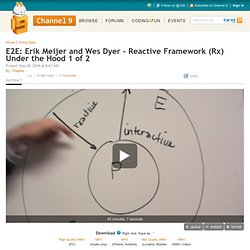
Well, wouldn't it be great to get the two key minds behind Rx in one place with one whiteboard? Yes, of course it would! Enter Software Developer extraordinaire and language compiler geek Wes Dyer and programming language design guru and LINQ co-creator Erik Meijer to dig into the "Live Labs Reactive Framework (Rx)" or ".NET Reactive Framework (Rx)". So, let's be honest here. The official name of this great technology has not been determined. Here, Erik and Wes focus on the core ideas behind Rx and dig into the geeky details of this observer-based programming model. Rx Wiki - Reactive Framework (Rx) Wiki. Essential Reactive Extensions with .NET 4.5 and LINQ. UI Code Expert Essential Reactive Extensions with .NET 4.5 and LINQ The Rx library utilizes the power of LINQ to make difficult asynchronous problems simple.
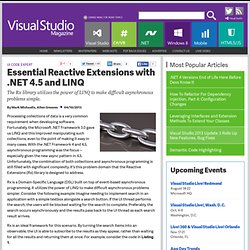
Processing collections of data is a very common requirement when developing software. Fortunately, the Microsoft .NET Framework 3.0 gave us LINQ and this improved manipulating such collections, even to the point of making it easy in many cases. With the .NET Framework 4 and 4.5, asynchronous programming was the focus -- especially given the new async pattern in 4.5. Erik Meijer: Rx in 15 Minutes - Rx is Here!!!!! First encounters with Reactive Extensions - Jon Skeet: Coding Blog. I've been researching Reactive Extensions for the last few days, with an eye to writing a short section in chapter 12 of the second edition of C# in Depth. (This is the most radically changed chapter from the first edition; it will be covering LINQ to SQL, IQueryable, LINQ to XML, Parallel LINQ, Reactive Extensions, and writing your own LINQ to Objects operators.) I've watched various videos from Channel 9, but today was the first time I actually played with it.
I'm half excited, and half disappointed. My excited half sees that there's an awful lot to experiment with, and loads to learn about join patterns etc. Writing your first Rx Application. DevCamp 2010 Keynote - Rx: Curing your asynchronous programming blues. Speaker: Bart de Smet Aufzeichnung vom DEVcamp 2010 in Wien, am 12.
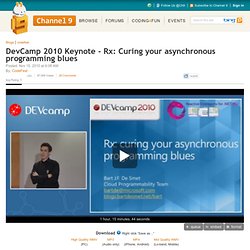
Oktober 2010 Organisiert von den Partnern TechTalk, Cubido und CSS.Microsoft Österreich unterstützte das Event als Hauptsponsor und hat auch selbst einige Sessions abgehalten. At Microsofts Professional Developers Conference (PDC) a few years back, we introduced the LINQ project to solve the impedance mismatch between various data models by means of integrated query syntax in mainstream programming languages. Today, we’re seeing a rich ecosystem around LINQ providers that allow developers to reach out to many more data sources. In this session, we'll cover the design philosophy of Rx, rooted on the deep duality between the interactive IEnumerable interface and the new reactive IObservable interface in .NET 4.
From this core understanding, we'll start looking at various combinators and operators defined over observable collections, as provided by Rx, driving concepts home by a bunch of samples. Channel 9 - Reactive Extensions. 69 Entries Language(s) 18 minutes, 33 seconds 14 minutes, 26 seconds 42 minutes, 30 seconds 27 minutes, 42 seconds 19 minutes, 37 seconds 16 minutes, 28 seconds. Reactive Extensions (Rx) is now Open Source. Helper Functions for Doing Rx in Angular. RxJS is a javascript implementation of the Reactive Extensions for doing Reactive Programming.
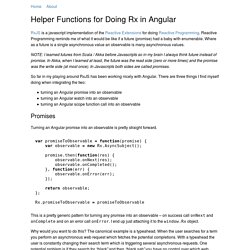
Reactive Programming reminds me of what it would be like if a future (promise) had a baby with enumerable. Where as a future is a single asynchronous value an observable is many asynchronous values. NOTE: I learned futures from Scala / Akka before Javascripts so in my brain I always think future instead of promise. In Akka, when I learned at least, the future was the read side (zero or more times) and the promise was the write side (at most once).
Rx and Await: Some Notes. Rx in Depth. 10 Entries Language(s) 22 minutes, 49 seconds 2 minutes, 3 seconds 2 minutes, 10 seconds 3 minutes, 32 seconds 2 minutes, 56 seconds 3 minutes, 44 seconds 1 minute, 51 seconds 2 minutes, 35 seconds 2 minutes, 36 seconds 1 minute, 47 seconds.
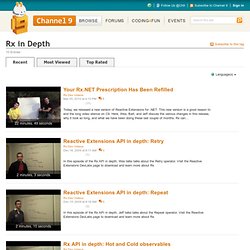
Rx Framework Part I - System.Reactive or the .NET Reactive Extensions (Rx) – Concepts and First Look. Recently, a lot of interest is bubbling up in the .NET community about reactive programming.
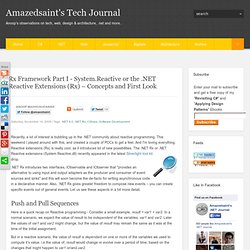
This weekend I played around with this, and created a couple of POCs to get a feel. And I'm loving everything. Reactive Extensions for .NET ( “stuff happens” ) I’ve been taking a look at the Reactive Extensions for .NET. It’s early days for me at this point but I’m finding what I’m seeing to be really interesting.
This is code that’s available from the DevLabs; and there are versions for .NET 3.5 Sp1, .NET 4.0, Silverlight 3, Silverlight 4 and also for JavaScript. The essence of the library is around consuming asynchronous and event-based work using observable collections that “push” items of interest at a composable set of observers. Event Centric: storing and consuming events. [Disclaimer: I don’t think this disclaimer is needed, but just to be on the safe side.
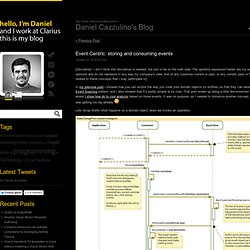
The opinions expressed herein are my own personal opinions and do not represent in any way my company's view, that of any customer current or past, or any current, past or future project related to these concepts that I may participate in] Collecting events from Event Log using Rx. The event collector was one of the features that represented a challenge for the team to implement.
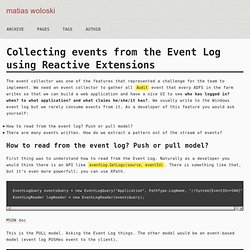
We need an event collector to gather all Audit event that every ADFS in the farm writes so that we can build a web application and have a nice UI to see who has logged in? When? To what application? Introducing Rx (Linq to Events) It’s the most wonderful time of the year: a new version of the Silverlight Toolkit has been released alongside Silverlight 3.
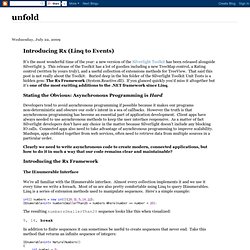
This release of the Toolkit has a lot of goodies including a new TreeMap control, a Rating control (written by yours truly), and a useful collection of extensions methods for TreeView. That said this post is not really about the Toolkit. Buried deep in the bin folder of the Silverlight Toolkit Unit Tests is a hidden gem: The Rx Framework (System.Reactive.dll). If you glanced quickly you’d miss it altogether but it’s one of the most exciting additions to the .NET framework since Linq. Stating the Obvious: Asynchronous Programming is Hard Developers tend to avoid asynchronous programming if possible because it makes our programs non-deterministic and obscure our code’s intent in a sea of callbacks.
Clearly we need to write asynchronous code to create modern, connected applications, but how to do it in such a way that our code remains clear and maintainable? Event Centric: finding key business value by leveraging domain events and reactive extensions. Reactive Extensions for .NET an Introduction.